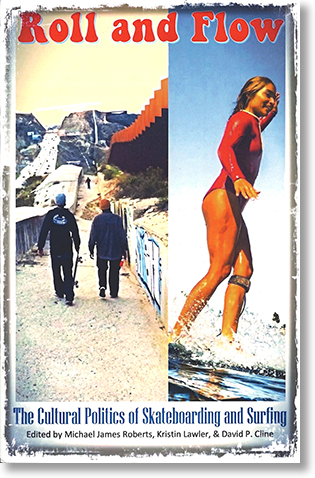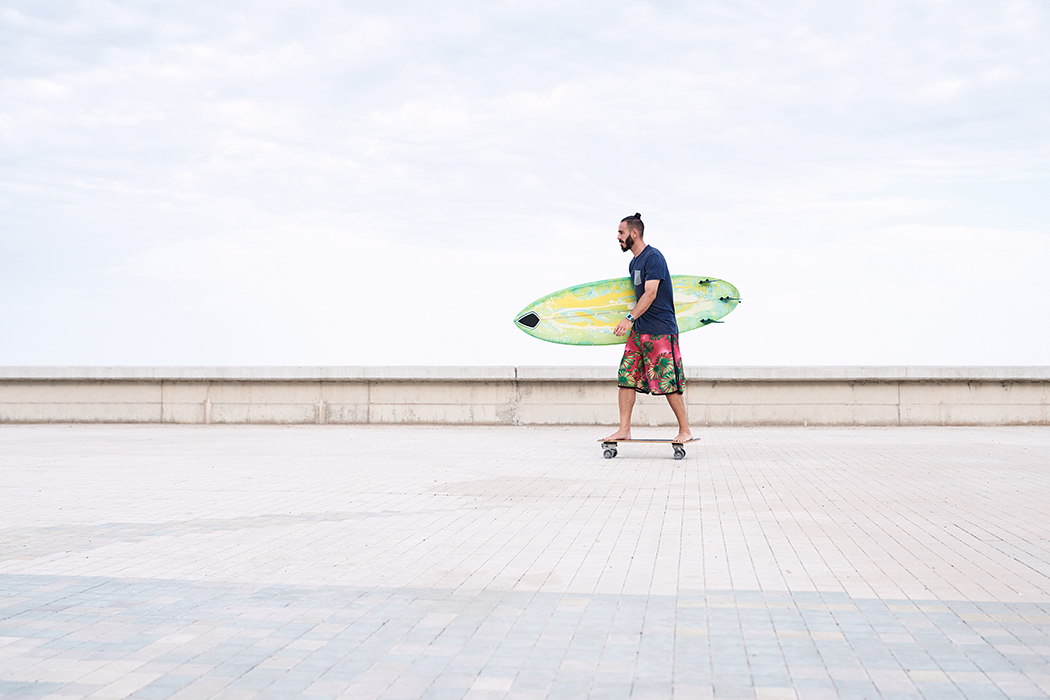Matthew L. McDowell
Moray House School of Education and Sport, University of Edinburgh

Roll and Flow: The Cultural Politics of Skateboarding and Surfing
394 pages, paperback, ill
San Diego, CA: San Diego State University Press 2024
ISBN 978-0-916304-87-4
Here is an intriguing collection released as part of San Diego State University’s Surf/Skate Studies Collaborative, at least partially based on papers held at two conferences organised by the group. (Disclaimer: I was an attendee at one of these events: The Stoke Sessions: An International Conference on the Culture, History and Politics of Surfing and Skateboarding, held at SDSU in April 2023.) Together, the editors and authors seek to combat an ingrained cultural stereotype of skateboarders and surfers as uncaring and apolitical. Towards this end, they highlight various historical threads, and in some cases speak to skaters and surfers themselves as a means of highlighting their diversity and their journeys into these activities. Like many other edited collections, some chapters are more successful than others. However, it will likely serve as a reference point in the field for years to come.
The book starts with a recent event as its catalyst for the collection. The Rolling for Rights rally, held in San Diego on 20 June 2020, surprised casual observers. It took part in support of the Black Lives Matter movement, in response to the death of George Floyd at the hands of a Minneapolis police officer. Skateboarders held similar protests all over US cities. Journalists and others, who had hitherto believed skaters to be a subcultural (monocultural) group who checked out of politics and institutions, were astonished by this show of unity. Towards that end, the authors use this collection to attempt to show many aspects of how such a display came about – from skateboarders and surfers’ years of environmental concerns, to their relationship with psychedelic culture and the New Left, and (perhaps even more surprisingly) its relationship with trade unionism.
Skateboarders, the two authors argue, are the logical descendants of flâneurs, as the concept was conceived by Walter Benjamin.
The book is divided neatly into two grand parts. The first seven chapters examine the cultural politics of skateboarding, while the final eight examine those of surfing. The chapters are of varying length, and also of varying novelty. In fact, there is perhaps another divide which is less clearly articulated in the table of contents between what is philosophical and theoretical, and what is empirical.
There is certainly plenty here which advances theory. Two of the editors, Kirstin Lawler and Michael James Roberts, bookend the skateboarding and surfing sections with hefty theoretical contributions which contextualise the means by which we might view both skaters and surfers as progressive figures. Skateboarders, the two authors argue, are the logical descendants of flâneurs, as the concept was conceived by Walter Benjamin. Later, regarding surfers, they discuss elements of a common lineage with anti-work ideology, as conceptualised by international anarcho-syndicalist union the Industrial Workers of the World: the authors believe that the Wobblies’ conception of “the bum” accurately fits the description of surfers who seek to escape the rat race. There are other theoretical contributions: cultural theorist Konstantin Butz ponders the movement of “surfing” onto suburban sidewalks, while Aaron James considers how changing work/leisure divides brought forward by the COVID-19 pandemic and “lockdowns” dovetail with debates on “growth” and “de-growth”. Cori Schumacher also discusses how surfing reflects (and often challenges) the political realities of the US in the 2010s and 2020s.

Perhaps because of my own background as a classically trained historian, I gravitate more towards the empirically based contributions. My very favourite is journalist Keith Plocek’s discussion of the storied relationship between surfing and sharks. It is a much discussed and mythical relationship, one which has almost nothing to do with how often sharks attack surfers, and everything to do with how these apex predators represent insecurities about capitalist greed (and yes, the mayor from Jaws makes an appearance). Plocek does not discuss the environment quite as much as Brian Glenney, but the latter also makes a brilliant contribution, this time on the phenomenon of much-loved skateparks being built on brownfield and “Superfund” sites in the US which may continue to mask pollution and risk beneath the surface. Jess Ponting et al’s discussion of sustainable surf tourism in Peniche, in southern Portugal, shows a significant resentment at the emergence of surf schools which prioritise temporary tourism over local surf cultures. In this chapter, we get to hear the voices of surfers; we also get to hear those of skateboarders a great deal in Andrea Buchetti’s tale of a cross US-Mexico border skater/worker at a factory which makes surfboards, and in David Cline’s interview with Tyrone “T-Bone” Olson and Alfonso “Suga Bear” Hughey, the organisers of the aforementioned Rolling for Rights rally. Theory is important, of course, but the voices of those involved provide the texture.
When most edited collections are read cover-to-cover, through no fault of the editors and no doubt because of the preferences (or prejudices) of readers/reviewers, they often come across as uneven. It is, however, worth noting two consistent issues with this volume. The first comes with references. I have no especial problem with footnotes being used over endnotes, but here references are not used simply to credit authors, but to place more theoretical discussion into already large chapters. Many readers will be grateful for that, and even enjoy it; for me, it was an unnecessary distraction. There is also the issue of coverage of subject matter. Despite (rightfully) taking great pains to show how diverse skater and surfer culture is, aside from Ponting et al’s contribution, as well as British historian Iain Borden’s chapter on skateboarding as cultural critique, this collection is dominated by California – a storied place in lifestyle sport, to be sure, but still a very specific context, and one not noted in the title. Perhaps this is a consequence of where the Collaborative is based, and where they hold their conferences – or indeed, where power exists in the world (of lifestyle sport). However, sitting here in the chill and clouds of a September in northern Europe, one wonders if there is something of a missed opportunity for more “Atlantic” (or, regarding skateboarding, even more “inland”) voices in these conversations. But perhaps the task here is for readers to do the work. Ultimately, this collection should prove successful in at least provoking debate on that subject: skateboarding and surfing, after all, are far greater than the sum of one imagined culture.
Copyright © Matthew L. McDowell 2025






